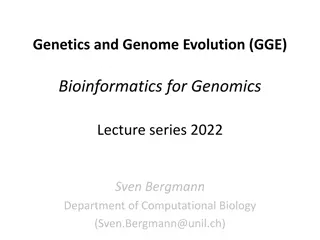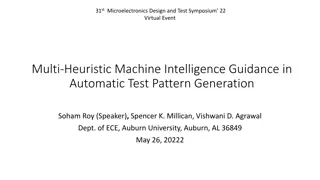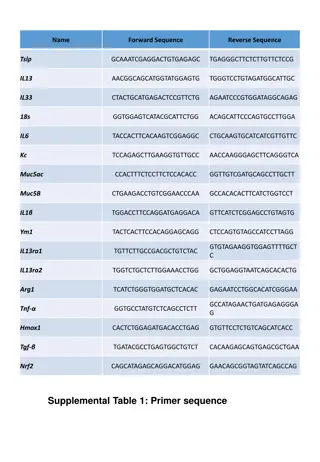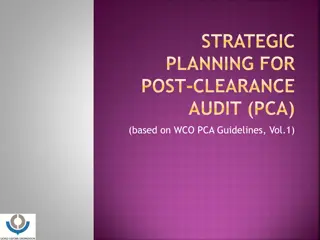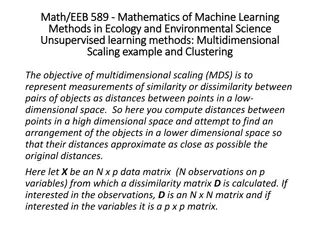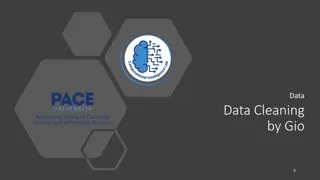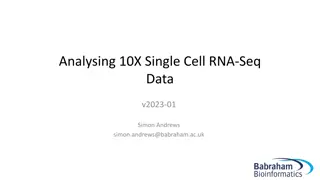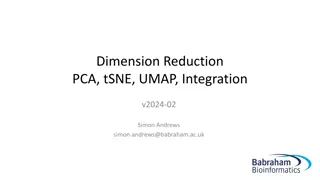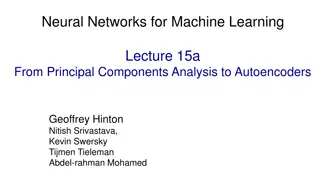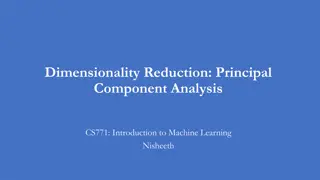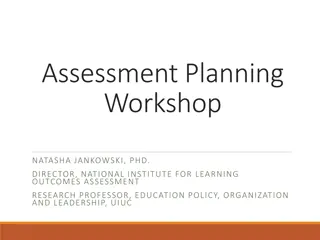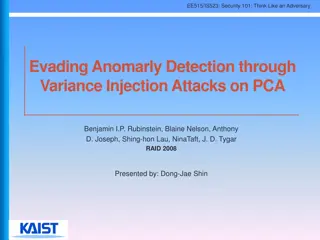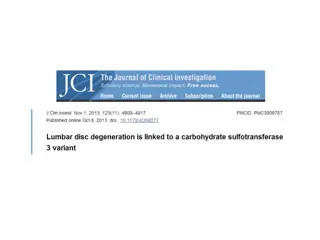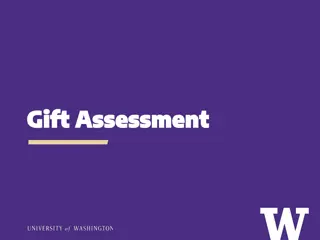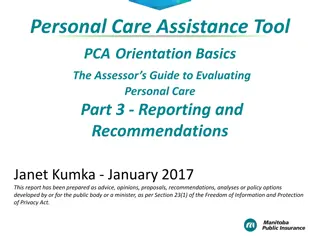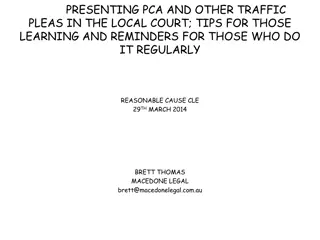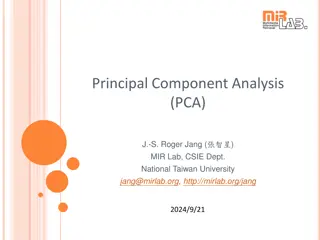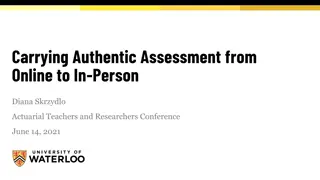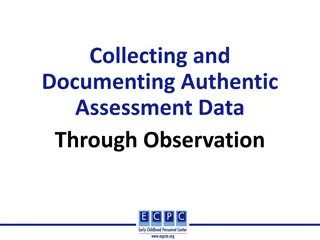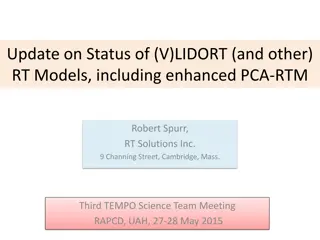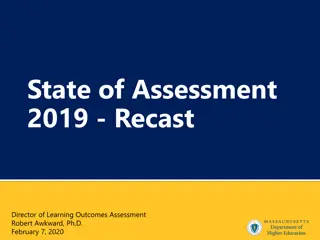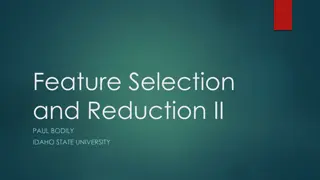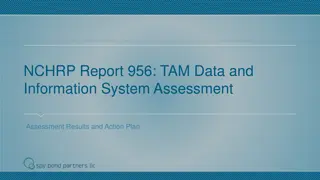Excel with Confidence PCA Linux Foundation Prometheus Certified Associate Exam Mastery
The PCA exam with confidence. Master the Linux Foundation Prometheus Certified Associate certification with comprehensive study materials, practice tests, and expert guidance. Gain the skills and knowledge needed to excel in Prometheus monitoring and alerting. Our resources will help you navigate th
1 views • 5 slides
Comprehensive Overview of Autoencoders and Their Applications
Autoencoders (AEs) are neural networks trained using unsupervised learning to copy input to output, learning an embedding. This article discusses various types of autoencoders, topics in autoencoders, applications such as dimensionality reduction and image compression, and related concepts like embe
4 views • 86 slides
Sheffield Early Help Assessment Form Update and Integration with Extended Support Plan
Sheffield has introduced an updated Early Help Assessment form to streamline the assessment process within the Early Help System. This new form combines the Early Help Assessment with the Extended Support Plan, aligning various assessment tools and referral forms into one comprehensive document. The
5 views • 22 slides
Enhancing Language Learning Through Peer Assessment
Explore the benefits of peer assessment as a valuable tool for language learning, comparing it with self-assessment. Discover the components and challenges of self-assessment, along with the potential of peer assessment to improve accuracy and promote self-regulation. Gain insights into what peer as
3 views • 29 slides
Overview of DSW End Point Assessment Team Leader Level 3
DSW End Point Assessment Team Leader Level 3 provides a clear understanding of the assessment process, ensuring individuals comprehend why and when it occurs, responsibilities involved, and how DSW supports them. It covers topics such as what End Point Assessment entails, assessment design and deliv
1 views • 18 slides
Bioinformatics for Genomics Lecture Series 2022 Overview
Delve into the Genetics and Genome Evolution (GGE) Bioinformatics for Genomics Lecture Series 2022 presented by Sven Bergmann. Explore topics like RNA-seq, differential expression analysis, clustering, gene expression data analysis, epigenetic data analysis, integrative analysis, CHIP-seq, HiC data,
0 views • 36 slides
Multi-Heuristic Machine Intelligence for Automatic Test Pattern Generation
The 31st Microelectronics Design and Test Symposium featured a virtual event discussing the implementation of multi-heuristic machine intelligence for automatic test pattern generation. The presentation covered motivation, modus operandi, experimental results, conclusions, and future works in the fi
1 views • 17 slides
Molecular Biology Study: Primer Sequences and Correlation Analyses
This study delves into the realm of molecular biology, focusing on primer sequences for various genes like IL13, IL33, Muc5ac, and more. Additionally, it explores PCA analyses of different study groups and correlation of variables using Pearson correlation coefficient. The research sheds light on th
0 views • 4 slides
Strategic Planning for Post-Clearance Audit (PCA) Based on WCO Guidelines
Explore the strategic planning aspects of Post-Clearance Audit (PCA) in line with WCO guidelines. Understand what PCA entails, its objectives, benefits, and limitations. Learn how PCA ensures compliance, verifies revenue, facilitates international trade, and more. Discover the importance of PCA as a
0 views • 19 slides
Understanding Multidimensional Scaling and Unsupervised Learning Methods
Multidimensional scaling (MDS) aims to represent similarity or dissimilarity measurements between objects as distances in a lower-dimensional space. Principal Coordinates Analysis (PCoA) and other unsupervised learning methods like PCA are used to preserve distances between observations in multivari
2 views • 21 slides
Comprehensive Guide to Data Cleaning and Preprocessing Techniques
Understanding the crucial concepts of data cleaning such as Garbage In, Garbage Out principle (GIGO), Non-Linear and Geographic data inspection, handling NaN values, feature scaling, PCA, correlations, and more. Explore the steps involved in cleaning and preprocessing data for data science and machi
0 views • 12 slides
Understanding 10X Single Cell RNA-Seq Analysis
This content delves into the intricacies of analyzing 10X single-cell RNA-Seq data, covering topics such as how 10X RNA-Seq works, evaluating CellRanger QC reports, dimensionality reduction techniques like PCA, tSNE, and UMAP, using the Loupe cell browser, and frameworks for scRNA analysis in R. It
0 views • 39 slides
Understanding Dimension Reduction Techniques in Data Analysis
Employing techniques like PCA, tSNE, and UMAP allows for effective visualization and integration of multi-dimensional datasets. These methods help in reducing data complexity to reveal patterns and insights for further analysis. Gene expression data is used as an example to illustrate the principles
0 views • 43 slides
Understanding Principal Components Analysis (PCA) and Autoencoders in Neural Networks
Principal Components Analysis (PCA) is a technique that extracts important features from high-dimensional data by finding orthogonal directions of maximum variance. It aims to represent data in a lower-dimensional subspace while minimizing reconstruction error. Autoencoders, on the other hand, are n
0 views • 35 slides
Understanding Assessment in Medical Education
Exploring the concepts of assessment in medical education, including defining assessment, types of assessment, reliability, validity, and aligning assessment methods with intended learning outcomes. The importance of constructive alignment and the impact of assessment on learning outcomes are also d
1 views • 12 slides
Guidelines for Post-Clearance Audit (PCA) - Implementation Steps
Understanding the steps involved in the implementation of Post-Clearance Audit (PCA) is crucial for effective customs procedures. This guide outlines the process, from developing audit programs to conducting field audits and reporting. Selection processes, pre-audit research, and notification proced
5 views • 11 slides
Understanding Dimensionality Reduction and Principal Component Analysis
Dimensionality reduction techniques like Principal Component Analysis (PCA) help in transforming high-dimensional data into a lower-dimensional space, leading to efficient storage and better understanding of underlying patterns. By capturing maximum variance in the data, PCA learns projection direct
5 views • 16 slides
Assessment Matters in Sociology: Enhancing Learning Through Evaluation
Explore the significance of assessment in sociology education, focusing on key questions to evaluate current assessment procedures, review individual course assessments, and develop strategies to enhance student learning outcomes. Delve into the centrality of assessment in the learning process, with
1 views • 15 slides
Issues and Developments in the 15th South West Pacific Hydrographic Commission Conference
Legislation expertise remains a challenge in the conference discussions. UKHO offered support for Nauru's position, exploring options for PCA. Maritime and port operations are focal points, with Australia considering a role as PCA. Technical assessments and assistance are on the agenda for future co
7 views • 1 slides
Insights into Managing Assessment in the Classroom by Assessment Research Group
Explore the importance of standards and assessment in education through the lens of the Assessment Research Group. Gain valuable perspectives on curriculum delivery, understanding the assessment system, learner assumptions, task parameters, and more. Discover how language, structure, and agency play
2 views • 25 slides
Workshop on Assessment Planning by Dr. Natasha Jankowski
Dr. Natasha Jankowski, Director of the National Institute for Learning Outcomes Assessment, conducts a workshop focusing on effective use of assessment data to enhance undergraduate education. The workshop covers areas like evaluating assessment plans, program learning outcomes, and assessment rubri
0 views • 30 slides
Enhancing Understanding through Assessment in Educational Design Workshop
Learn and collaborate on assessment practices in education design at the "Understanding by Design Assessment Focus" workshop. The agenda includes sessions on summative and formative assessment, feedback, reporting, and more. Engage in activities like generating questions, finding destination partner
1 views • 76 slides
An Overview of Evading Anomaly Detection using Variance Injection Attacks on PCA
This presentation discusses evading anomaly detection through variance injection attacks on Principal Component Analysis (PCA) in the context of security. It covers the background of machine learning and PCA, related work, motivation, main ideas, evaluation, conclusion, and future work. The content
1 views • 19 slides
Institutional Assessment Planning Workshop Feedback and Insights
Feedback and insights from a recent institutional assessment planning workshop led by Dr. Mark Nicholas at FSU S. Warren Conference Center & Inn. Participants provided feedback on the usefulness of the content, presenter knowledge, ability to develop assessment plans, post-training assessment knowle
1 views • 9 slides
Exploring Ancestry and Traits Through SNPedia and PCA Analysis
Delve into the world of genetics and ancestry analysis through SNPedia, a comprehensive resource for Single Nucleotide Polymorphisms (SNPs) information. Discover how Principle Component Analysis (PCA) simplifies genetic data to reveal insights into ancestry, traits, and informative SNPs. Explore exa
0 views • 33 slides
Understanding Higher Education Assessment: The Complete Guide
Higher education assessment involves a systematic process of collecting, reviewing, and utilizing information to improve student learning and development. This guide covers the assessment cycle, learning outcomes, the mission behind assessment in higher education, what assessment is and is not, reas
1 views • 36 slides
Understanding Gift Assessment Process at University of Washington
The Gift Assessment Process at University of Washington involves applying a 5% assessment to select current-use gifts over $1,000 and under $5 million. This assessment supports the university's advancement efforts and institutional priorities by transferring 5% of eligible contributions to the Provo
1 views • 5 slides
Overview of Environmental Impact Assessment and Strategic Environmental Assessment Directives
Environmental Impact Assessment (EIA) and Strategic Environmental Assessment (SEA) play crucial roles in evaluating the impact of planned activities on the environment. This content delves into the concept, origins, development, and key elements of environmental assessment, discussing the legal fram
2 views • 35 slides
Comprehensive Guide to Reporting in Personal Care Assistance Assessment
The report outlines the importance of accurate reporting in Personal Care Assistance (PCA) assessments, emphasizing compliance with regulations and the need for current information. It provides guidance on submitting PCA reports, ensuring accuracy in claimant details, and avoiding misleading informa
0 views • 16 slides
Institutional Assessment and Effectiveness Workshop Achievements at SUNY Oneonta
The Office of Institutional Assessment and Effectiveness at SUNY Oneonta has made significant progress in developing assessment protocols and processes, leading to a culture of assessment. This includes completing planning and assessment cycles, establishing objectives and procedures, and aligning u
1 views • 16 slides
Tips for Presenting PCA and Traffic Pleas in Local Court
Explore essential tips and reminders for presenting PCA and other traffic pleas in the local court from evidence preparation to sentencing considerations. Covering topics from alcohol alternatives to disqualification, this content offers valuable insights for legal professionals and learners alike.
0 views • 27 slides
Understanding Principal Component Analysis (PCA) in Data Analysis
Introduction to Principal Component Analysis (PCA) by J.-S. Roger Jang from MIR Lab, CSIE Dept., National Taiwan University. PCA is a method for reducing dataset dimensionality while preserving spatial characteristics. It has applications in line/plane fitting, face recognition, and machine learning
0 views • 23 slides
Oregon Department of Education Assessment and Accountability Resources
Access important information on assessments, accountability, and reporting from the Oregon Department of Education. Find resources on updating assessment records, accessing student scores, and staying informed about assessment requirements for the 2023-24 academic year. Explore links for assessment
0 views • 55 slides
Oregon Department of Education - Assessment Resources and Updates
Explore the Assessment Record Updating Application (ARUA), Accountability Warehouse Extract (AWE), Secure Assessment Reports, and other important tools and information provided by the Oregon Department of Education for assessment data owners, analysts, and partners. Access links for assessment admin
0 views • 54 slides
Enhancing Teaching Assessment for Actuarial Education
Exploring the transition of assessment practices from online to in-person settings, this presentation by Diana Skrzydlo at the Actuarial Teachers and Researchers Conference delves into the purpose of assessment, key principles, and activities for effective evaluation. Discover insights on diagnostic
0 views • 10 slides
Authentic Assessment through Systematic Observation: Best Practices
Explore the process of authentic assessment through systematic observation in early childhood education. Learn about collecting, documenting, and interpreting assessment data using evidence-based practices and technology. Discover the importance of working collaboratively with families and professio
0 views • 53 slides
Overview of V*LIDORT and Other Radiative Transfer Models by Robert Spurr
The presentation provides an update on the status of V*LIDORT and other radiative transfer models as discussed at the Third TEMPO Science Team Meeting. It covers the LIDORT family overview, upgrades to the codes, new releases for RT models, and accelerated RT developments using PCA. The V*LIDORT cod
0 views • 12 slides
Assessment Practices in Higher Education Institutions
Dive into the state of assessment for the year 2019, featuring insights on hosting assessment days, establishment of assessment committees, implementation of institutional and program learning outcomes, appointment of a Director of Assessment, compensation for faculty members focusing on assessment,
0 views • 8 slides
Understanding Feature Selection and Reduction Techniques Using PCA
In machine learning, Principal Components Analysis (PCA) is a common method for dimensionality reduction. It helps combine information from multiple features into a smaller set, focusing on directions of highest variance to eliminate noise in the data. PCA is unsupervised and works well with linear
0 views • 18 slides
NCHRP Report 956 TAM Data and Information System Assessment
This content provides an overview of NCHRP Report 956 focusing on the TAM data and information system assessment results and action plan. It includes details on assessment outcomes, recommendations, implementation action plans, and tools for self-assessment and improvement methodology. The content a
0 views • 21 slides





